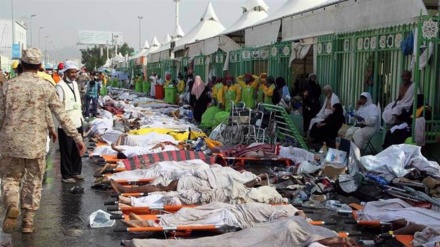Congratulation for Eid al-Adha & Condolences for Mena Martyrs
Salaam and along with our heartiest congratulations to you all on the auspicious day of Eid al-Adha, the Feast of Sacrifice, are our heartfelt condolences on last year’s unwarranted stampede at Mena that was triggered by the Saudi regime and resulted in the death of some 7,000 Hajj pilgrims from various countries, including 500 Iranians.
We can never forget the mischief and mismanagement of the Wahhabi clique, which violates the letter and spirit of the holy Qur’an, and has turned the Abrahamic Hajj into a lifeless set of ritual devoid of the life-inspiring chants of “bar’aat min al-mushrikeen” as commanded by Almighty God in Surah Towba of the holy Qur’an.
The 10th of Zil-Hijja is the day of remembrance of the proof of the firm and unflinching faith of Prophet Abraham in God and how he obeyed the Divine Commandment to offer his firstborn son, Ishmael, as sacrifice. It is the Day on which the All-Merciful Lord accepted Abraham’s sincere offer by replacing it at the last moment with a ram sent from heaven, so that Ishmael will live, marry, produce children, and be the ancestor of Prophet Mohammad (SAWA), whose grandson, Imam Husain (AS) will offer the greatest ever sacrifice with his lifeblood in Karbala, as God says in ayah 107 of Surah Saffaat:
“And we ransomed him with the Great Sacrifice.”
The 10th of Zil-Hijjah thus marks the climax of the Hajj rituals on the plain of Mena near Mecca witnesses where the pilgrims stone the symbolic devil to demonstrate their determination against all forms of temptations and tyranny, and then offer sheep, cattle, or camel, as sacrifice. This is indeed the pinnacle of monotheism. No wonder, ayah 79 of Surah Anaam has preserved Prophet Abraham’s remarkable words:
"Indeed I have turned my face toward Him who originated the heavens and the earth, as a Hanif, and I am not one of the polytheists."
In Islamic culture, Eid has a specific meaning. It means happiness or state of joy on the successful performance of duties. A Muslim is a person who is committed to the responsibilities entrusted by God. For this reason, whenever our work is sincerely and solely for the sake of God and is pleasing in the sight of God, as well as pleasing to our self, it is the day of Eid. Thus, the Hajj pilgrims who are still encamped at Mena to observe the rest of the rituals, have the opportunity to express their sincere wishes to God, and hopefully these will be accepted. The Prophet’s 6th Infallible Heir, Imam Ja’far Sadeq (AS) says Mena was so named because Archangel Gabriel asked Prophet Abraham to express his wish. It is the place where the temptations of the Satan came to naught on three occasions – when he tried to make Ishmael disobey Abraham’s regarding the divine commandment of sacrifice; when he attempted to mislead Hajar against her husband Abraham’s intention; and when he failed to dissuade Abraham from carrying out God’s commandment. Hence the three columns in Mena indicating the places where Satan approached the three blessed persons are stoned to this day, as part of the obligatory Hajj ritual by pilgrims to drive away the internal and external Satans.
The meat of the animals sacrificed in Mena is donated to the poor so that in this way they get close to God Almighty. In ayah 37 of Surah Hajj, God says:
"It is not their flesh or their blood that reaches Allah. Rather it is your Godwariness that reaches Him."
This ayah means to say that neither the flesh nor the blood of your sacrifices reaches God, but it is your piety and sincerity which is important to Allah. Iran’s contemporary Islamic Thinker, Ayatollah Mohammad Rayshahri says: Piety has certain degrees and sacrifice is the highest point of piety. The first degree is to avoid wrongdoing; the still higher degree is to avoid evil acts including sins, and the highest degree is to sacrifice in the way of God, whatever one possess. In other words, the when we are ready to give up all things and persons dear and near to us, and devote ourselves wholly to God, then we have reached the absolute state of the Ultimate Beloved and Besought of all, that is God Almighty, like Prophet Abraham practically demonstrated to us.
The rituals of Eid al-Adha have historical roots going back in antiquity to Prophet Abraham (AS). He was wholly resigned to the Will of God in all affairs. The holy Qur’an well presents glimpses of his selfless servitude to God, as well as that of his firstborn son, Ishmael. Abraham and his wife Sarah had grown old and failed to produce any child. Abraham prayed to God for an heir to succeed. The prayer was answered when his wife offered to him as the second spouse, the Egyptian maid Hajar, who conceived and Ishamel was born. A few years later, God granted another son to Abraham, and this time through his wife Sarah, who was old and well beyond child-bearing age. Thus after the miraculous birth of Isaac, Sarah became jealous of Hajar and Ishmael and told Abraham to remove them from her sight. On God’s command, Abraham took Hajar and Sarah to the remote Arabian Desert in the then obscure place called Mecca and left them there. In this waterless tract, after a mother’s anguish for water for her thirsty son, the ground suddenly gushed with a spring from under the feet of little Ishmael. This is the holy well of Zamzam from pilgrims drink till this day. When Ishmael had entered his teens, Abraham returned to Mecca, where he was ordered by God to sacrifice his firstborn son. The devout Abraham told his dream to Ishmael, who told the doting father to carry out God’s commandment without any hesitation. Ayah 102 of Surah Saffaat informs us in this regard:
"Father! Do whatever you have been commanded. If Allah wishes, you will find me to be patient."
As we said earlier, Abraham and Ishmael both emerged victorious from this divine tribulation, without the least harm, thereby proving the lofty degree of their faith to all subsequent generations. God rewarded both father and son, and ordered them to rebuild the holy Ka’ba which was lying in ruins since the great deluge of the days of Prophet Noah. After completing this mission, God ordered them to invite mankind to perform pilgrimage. In the wilderness of Mecca Abraham made the call that reverberated through hills and valleys. Till this day, pilgrims from all over the world flock to the Ka’ba for the monotheistic Hajj that was revived by Prophet Mohammad (SAWA). Thus in ayahs 109 and 110 of Surah Saffaat, God says of His devoted servant:
"Peace unto Abraham!"
"Thus do We reward the virtuous."
Happy Eid al-Adha for the Muslim World, but with thoughts for the martyrs of last year’s massive mismanagement at Mena, as well as tributes to the “Zibhin Azeem” or the Great Sacrifice, that is Imam Husain (AS), through whom God Almighty ransomed Prophet Ishmael after having tested the firm faith of Prophet Abraham.
AS/MG


